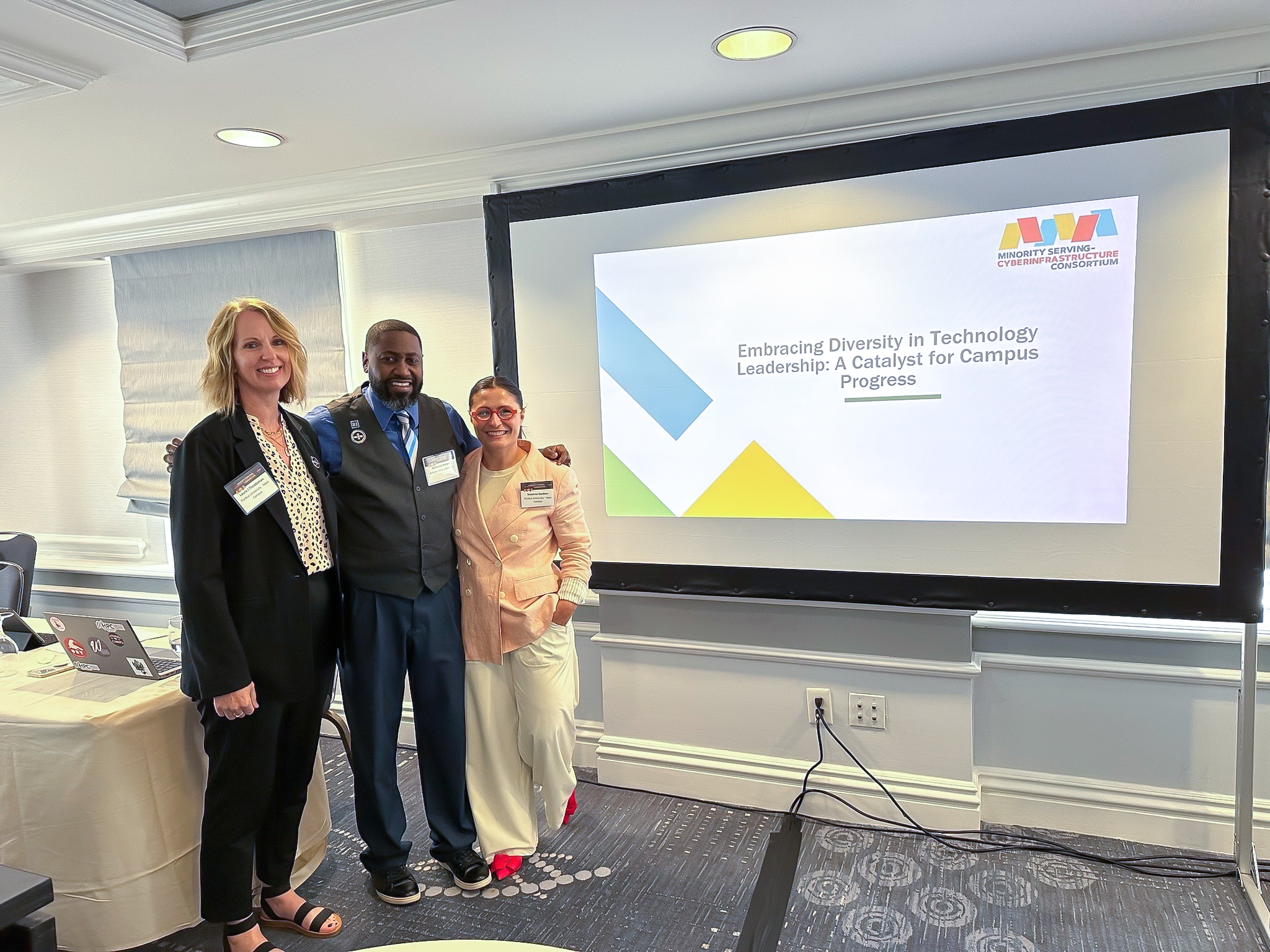RCAC participates in the Minority Serving – Cyberinfrastructure Consortium annual meeting
Suzanna Gardner, Senior  Research Operations Administrator of Outreach and Engagement for the Anvil supercomputer at RCAC, and Laura Theademan, Director of Center Operations and Visualization at RCAC, recently presented at the 2024 Minority Serving – Cyberinfrastructure Consortium (MS-CC) Annual Meeting. The pair presented alongside Dameion Brown, the Director of Information Security & Chief Information Security Officer in the Division of Information Technology at Jackson State University, on the topic of “Embracing Diversity in Technology Leadership.”
Research Operations Administrator of Outreach and Engagement for the Anvil supercomputer at RCAC, and Laura Theademan, Director of Center Operations and Visualization at RCAC, recently presented at the 2024 Minority Serving – Cyberinfrastructure Consortium (MS-CC) Annual Meeting. The pair presented alongside Dameion Brown, the Director of Information Security & Chief Information Security Officer in the Division of Information Technology at Jackson State University, on the topic of “Embracing Diversity in Technology Leadership.”
The Minority Serving – Cyberinfrastructure Consortium (MS-CC) is a community of information technology (IT) professionals, campus leaders, faculty members, researchers, and students from across the nation who have come together to improve cyberinfrastructure (CI) capabilities at historically Black colleges and universities, tribal colleges and universities, Hispanic-serving institutions, and minority-serving institutions. The goal of MS-CC is to promote advanced CI for teaching, learning, research, and enterprise technology capabilities at these historically under-resourced institutions. This year, the second annual meeting took place in Washington, D.C., from May 29th through the 31st. At the meeting, MS-CC members gathered to discuss sustainable campus-level IT capabilities for data-intensive education and research programs.
During their presentation, Brown, Gardner, and Theademan discussed the importance of embracing and recognizing diversity within technology leadership on campuses. In their view, diversity not only includes women and traditionally underrepresented minority groups, but also those with a non-technical background. The trio highlighted the importance of diversity and inclusion within CI (innovation and creativity, better decision making, etc.) as well as the challenges faced by underrepresented leaders in the field and strategies for overcoming these challenges. Some of these strategies include hosting mentorship and sponsorship programs, actively addressing bias and discrimination, and creating a safe space for open dialogue. The group also noted that the MS-CC Annual Meeting is exactly the type of event that can help overcome equity challenges.
“I am grateful for the opportunity to present alongside Laura and Dameion,” says Gardner. “This experience has been eye-opening, highlighting the absolute need for inclusion. I came back with the stark realization: diversity is inevitable. Due to immigration, migration, technology, and the blending of socio-economic, religious, cultural, and racial backgrounds in our workplaces and communities, diversity will continue to shape our society. We must look ahead and ask ourselves: How can we achieve genuine inclusivity? How can we bring individuals from various backgrounds into innovation and decision-making spaces? How can we cultivate cultural sensitivity in our interactions? The diversity train is unstoppable. We must harness and celebrate our differences, inviting change into our organizations. By doing so, we not only adapt but thrive in an ever-evolving world.”
“It was an honor to present with these two accomplished professionals,” says Brown. “Our relationship with Purdue and each other grew so fast in such a short time. I am overjoyed that our efforts in bringing to light gaps, disparities, and shortcomings in technology, the academic space, and professional development can be addressed collectively. Working together is encouraging and motivating. The MS-CC was overwhelmed by the response and is looking for more. I plan to continue with our relationship and am looking forward to working together with Laura and Suzanna soon.”
"Presenting alongside Suzanna and Dameion was an incredibly rewarding experience,” says Theademan. “The warm welcome from the MS-CC community made it an honor to participate in the annual meeting. We are committed to improving inclusivity and diversity within our organizations, driving positive change, and fostering a culture where all voices are heard and valued. By working together, we can create environments that encourage innovation and growth for everyone. We all have so much to learn from each other!"
The 2024 MS-CC Annual Meeting was a widely attended event, allowing for excellent discourse on improving campus CI on underrepresented campuses. Outside of presenting, Gardner and Theademan were able to make new connections and discuss how Anvil can help support minority-serving institutions. Some of these discussions have already led to the potential for exciting new projects and collaborations.
“We are thrilled to discover new ways Anvil can broaden CI adoption at historically underserved institutions, including MS-CC member institutions,” says Gardner. “Our innovative ideas are already taking shape, and we look forward to presenting them at next year’s annual MS-CC meeting."
To view the group’s presentation, please visit: https://www.rcac.purdue.edu/about/presentations
The MS-CC Annual Meetings are made possible thanks to support and funding from the National Science Foundation under award numbers 2137123 and 2234326.
Anvil is Purdue University’s most powerful supercomputer, providing researchers from diverse backgrounds with advanced computing capabilities. Built through a $10 million system acquisition grant from the National Science Foundation (NSF), Anvil supports scientific discovery by providing resources through the NSF’s Advanced Cyberinfrastructure Coordination Ecosystem: Services & Support (ACCESS), a program that serves tens of thousands of researchers across the United States.
Researchers may request access to Anvil via the ACCESS allocations process. More information about Anvil is available on Purdue’s Anvil website. Anyone with questions should contact anvil@purdue.edu. Anvil is funded under NSF award No. 2005632.
Written by: Jonathan Poole, poole43@purdue.edu
